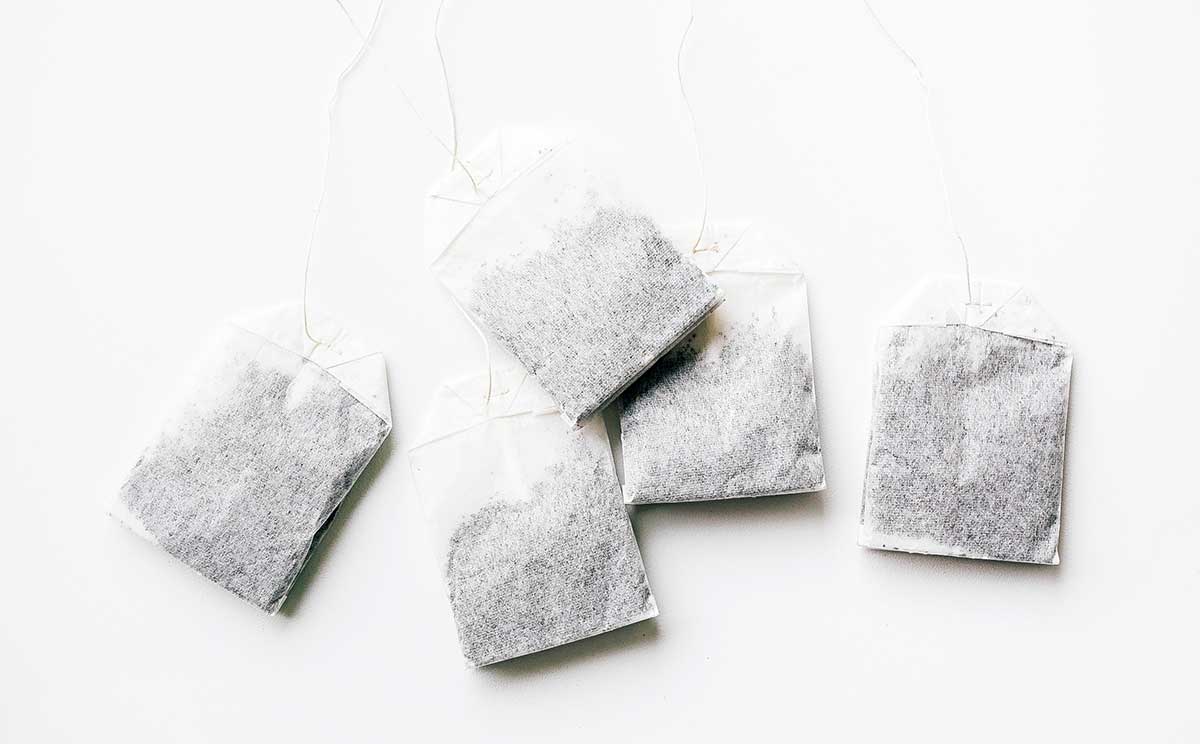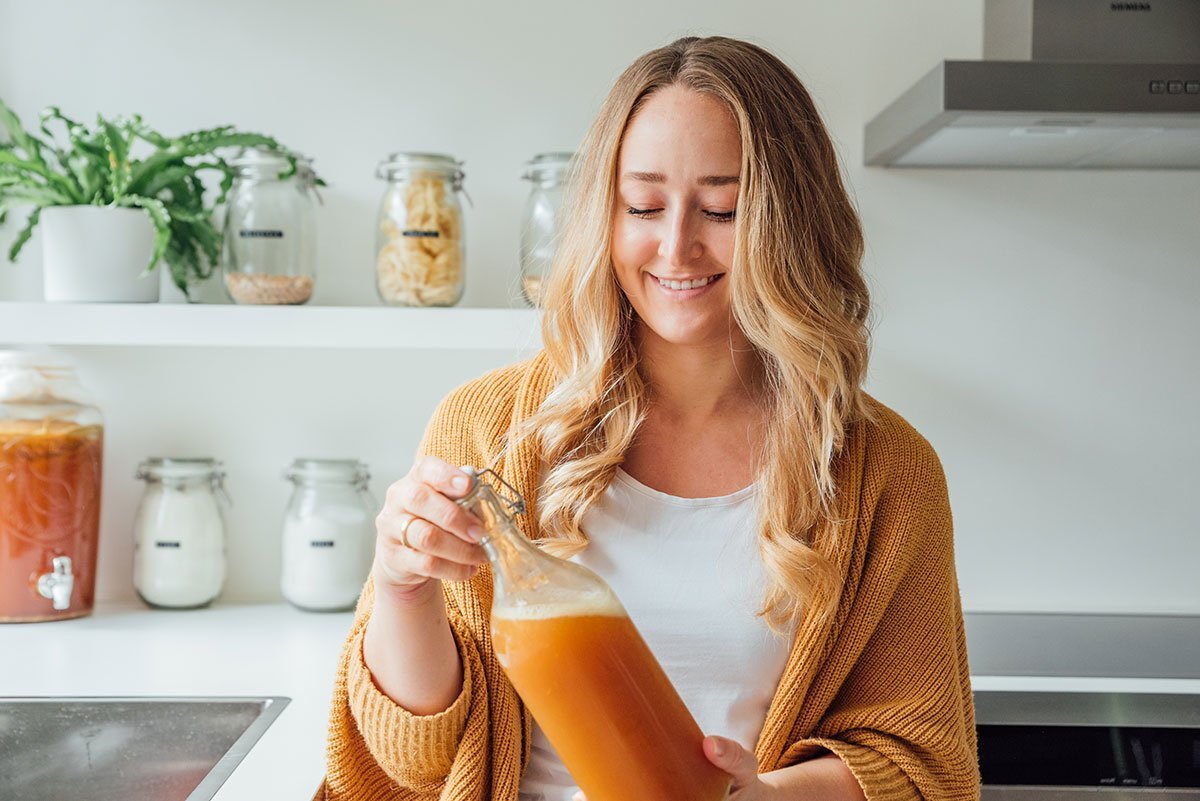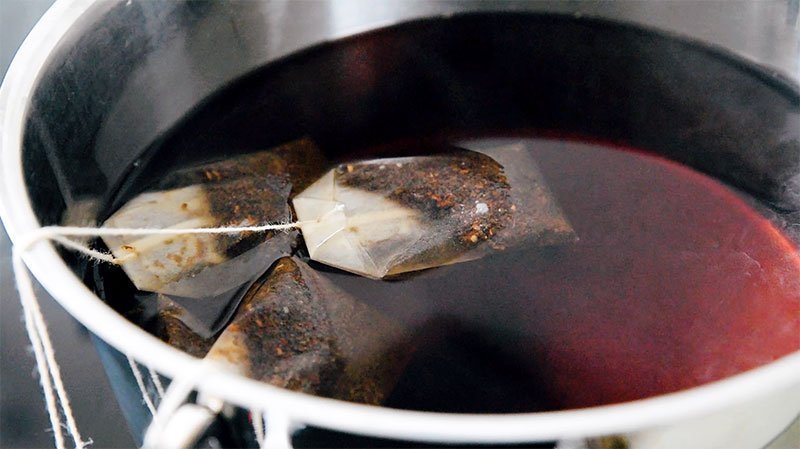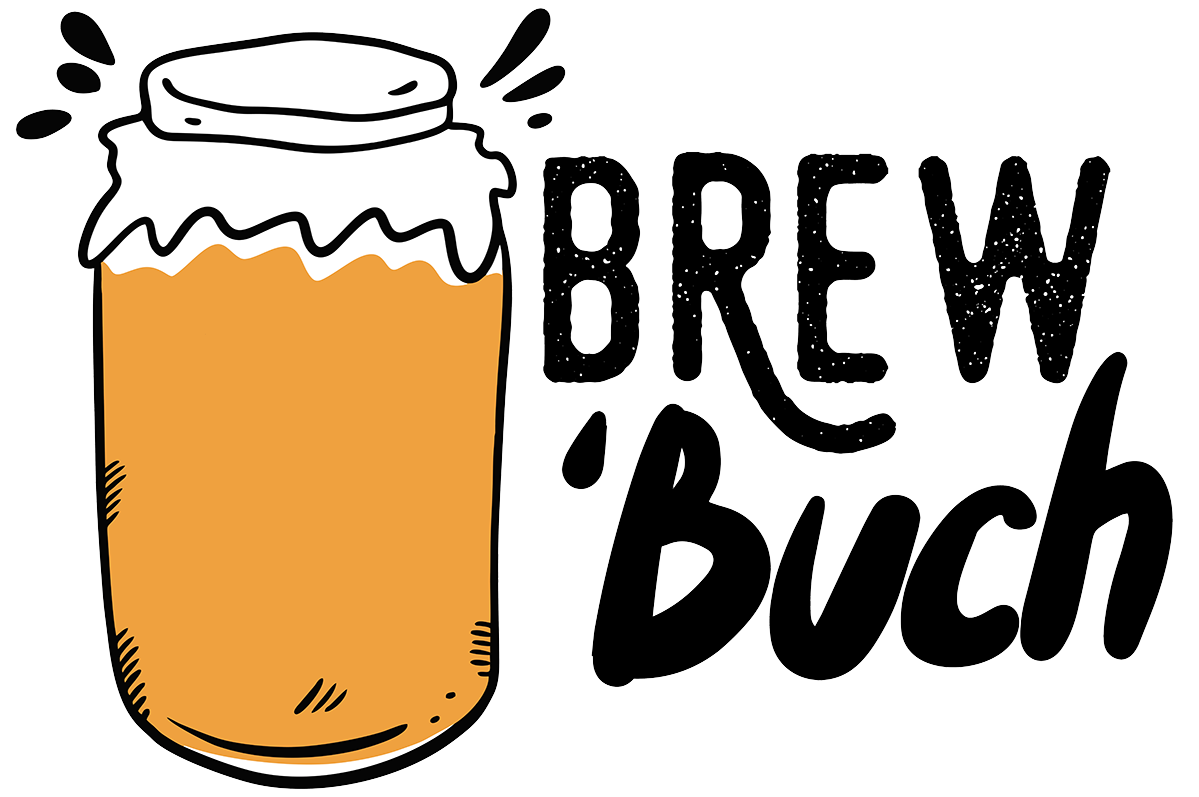Which teas should you use for making homemade kombucha? And which teas should you avoid? Breaking down the best tea for kombucha here!

Homemade kombucha basically has just four ingredients: tea, water, sugar, and starter kombucha. This means it’s vital that you use good quality, proper ingredients when starting your fermentation.
So in addition to making sure that the tap water in your area is good for kombucha and that you’re using the right sugar, make sure you’re using a tea that your kombucha and SCOBY will thrive on!
What is tea?
With tea easily being the most popular drink in the world, there are thousands of varieties of tea and they all seem to boil down to a common trait – plants soaked in hot water.
When people are talking about tea, however, they’re usually talking about the tea plant known as camellia sinensis. This is the plant that gives us black, green, white, and oolong tea.
This popular tea also happens to be the tea that your kombucha SCOBY loves! While sugar provides energy for the yeast to eat, the tea provides minerals that the bacteria and yeast need (more on how a SCOBY works here). Ensuring you use the correct tea for your kombucha will create a healthy SCOBY that will continue churning out batches for years to come.

Best tea for making kombucha
Black Tea: Tea leaves that have been oxidized for a long time (longer than green or oolong teas), creating a strong flavor. Common types of black tea that work well in kombucha include Ceylon and English Breakfast (avoid Earl Grey, see “tea to avoid” below). When growing a SCOBY, only use black tea. Once your SCOBY has been through 4 or 5 batches, you can begin introducing other teas.
Green Tea: Tea leaves that have been minimally oxidized, creating a mild earthy flavor. Use green tea in combination with another tea or on its own. (Our guide to types of green tea leaves here!)
Oolong Tea: Tea leaves that have been partially oxidized (more than green tea but less than black tea), creating a mild grassy to fruity flavor. Use oolong tea in combination with another tea or on its own.
White Tea: While black, green, and oolong teas are made from mature tea leaves, white tea is made from the young leaves and is minimally oxidized. This creates a delicate flavor and light color. Use white tea in combination with black, green, or oolong tea (at least 25% of mature tea leaves)
Some Herbal Teas: “Herbal tea” is a catch-all term that includes any tea not made from tea plant leaves. Herbal teas can be made from herbs, spices, or plants. While most herbal teas are not suitable for fermentation, there are a few that are suited for kombucha:
- Rooibos Tea: Made from the leaves of a South African shrub, this is a different species of tea, giving an earthy flavor to kombucha. Use rooibus tea in combination with black tea (at least 25% black tea).
- Hibiscus Tea: Made from the dried flowers of the hibiscus plant, this bright pink kombucha has a tart, floral flavor. Use hibiscus tea in combination with another tea or on its own.
- Butterfly Pea Flowers: Made from the dried flowers of the butterfly pea plant, this bright blue/purple kombucha has a floral, slightly earthy flavor. Use butterfly pea flower tea in combination with another tea or on its own.
But don’t let that stop you…
Many of our readers have experimented to with different types of tea with much success! Like Jennifer, who comments: “Hi Sarah. I made a batch of F1 using 2 tbsp Blackcurrant loose leaf tea and 8 black tea bags. I was amazing. I’m just waiting for a second batch to be ready in a day or so!” Comment with your favorite tea for kombucha below!

Tea to avoid when making kombucha
Most Herbal Teas: Most herbal teas are not suitable for brewing kombucha, as they don’t have the nutrients needed for your fermentation to thrive (and can actually lead to kombucha mold!)
Tea with added flavor: Many teas contain not only tea leaves, but the addition of spices or oils. Avoid tea that has anything added, as it can react with the kombucha and cause your fermentation to go bad. Examples of tea with added ingredients include:
- Earl Grey: Avoid this black tea variety, which has added bergamot oil.
- Chai: Avoid this black tea variety, which has added spices.

Can you use Loose leaf?
You can use loose leaf tea to make kombucha! For every 4 bags of tea used in the kombucha recipe, substitute 1 Tbsp of loose leaf tea.

Question: is regular white cane sugar non organic ok for use and regular black tea non organic ok for use . Just starting
Yep and yep!
I have been using green tea bags and adding a couple spoons of herbal tea for added flavor for months now and it has been working out very well for me!
Am I able to use decaf black tea ?
You can, but every few batches should be with normal tea to help keep the fermentation healthy!
Can mushroom “tea” be used?
I haven’t tried this so I can’t say for sure, but I think you would need to supplement with black tea.
Has anyone successfully used fresh ginger instead of tea? My son is allergic to caffeine and I am looking for brewing alternates.
I’ve been brewing Kombucha for about 6mths, usually I brew it using 2x green Tbags and 2xMoringa Tbags for 2ltrs. I find it has quite a refreshing taste
After the kombucha is done fermented do I have to wash the scoby and start all over again to make a new batch? After it had fermented do I drink direct the way it is or I have to mix with another drink? Please let me know. Thank you
You don’t need to wash the SCOBY or the jars as long as they were exposed to dirty utensils or hands. And you can drink it directly or mix it, totally up to you!
Can I use Alkaline water to make this?
I have only tried with tap and bottled water, so I can’t say for sure. But I think so?
You can but i believe this would be counterintuitive as the brewing process of Kombucha involves your tea lowering in ph to make the acidic nature the brew needs to thrive which is the opposite of alkaline. Acidity is your friend when brewing kombucha as it also mitigates molds and unfavorable bacteria from forming.
I’m enjoying reading your information about kombucha tea and making a scoby hotel but I was shocked when you mentioned to not use chai tea. I have been brewing kombucha using organic green tea for about 7 years, and decided to take a scoby and use a tea made from Twinings chai tea. I tweaked my recipe to be 4 chai tea bags plus 1 vanilla chai black tea bag with a gallon jug. I loved this blend so much that I do a double batch. I’ve never had a mold problem. In fact, we have sealed each type of scoby in a bag, put them in checked baggage and taken them with us when we fly between our home in the north and Florida several times. I just wanted to share my experience using chai tea which I am enjoying.
Thanks for the nice post, it was very helpful and knowledgeable to me.
Hi Sarah. I made a batch of F1 using 2 tbsp Blackcurrant loose leaf tea and 8 black tea bags. I was amazing. I’m just waiting for a second batch to be ready in a day or so. It looks healthy – but I’m wondering if I’m setting myself up for some kind of disaster. I can’t find any info on using blackcurrant tea for any F1’s anywhere! Do you think my scoby might die off eventually? Am I okay to be using blackcurrant tea?
I haven’t used this tea before, but I think as long as you’re supplementing it with black tea, like you’re already doing, then it should be fine! 😀
Hello,
Just a note on tea bags. Check the bag is not made using plastic. I drink Yorkshire tea here in the UK, plastic free.
If I used 1/2 English Breakfast and 1/2 Chai tea, do i need to toss it all?? It developed a SCOBY, but since this is only my third batch, still hard to totally tell if SCOBY has mold or not, even with researching SCOBY galleries online. Some areas are more light gray than tan. Also, if a batch is not carbonated enough, do i just add a little more sugar or agave to each bottle and wait a few days?
I would probably throw away a batch made with chai tea, but you’re welcome to post a photo in our Facebook Group for some brewer opinions! And yep, add a bit more sugar and seal shut for a few days!
Has anyone tried using fresh (deied) papaya or paw paw leaves in Kombuca?
I haven’t tried that!
I literally just started making Kombucha, have made one batch and my second batch is now fermenting. I like my tea a little stronger. So instead of 3 TBSP/Gallon, I used 3 heaping TBSP (1-Tbsp Eng Break, 2-Tbsp Oolong). Will too strong of tea harm my SCOBY?
Nope that small change should be fine! 😀
I have recently entered the Kombucha home game and sampled my first bottle this morning. By mistake, I bought Earl Grey black tea and used it to make my SCOBY. It turned out great and this was my first try. It did take quite a long time to get an acceptable SCOBY…about 6 weeks. However, this may have been due to the temp in our house during winter which was between 68-71F. Nonetheless, the SCOBY ended up pretty big and after 3 days on 2nd fermentation, I tasted my lemon-ginger bottle this morning. The taste was quite good, but a tad sweet and not quite as fizzy as I would like. I have it out and will let it ferment for another 2 days or so to ferment more sugar out and increase fizziness. I have another 2 bottles which I will continue to ferment and taste later.
Interested to know how you got the lemon ginger flavor… from a tea or fresh ingredients?
Hi. I’m using loose leaf Darjeeling tea and wondered if I could use the leaves for two batches or have to use fresh leaves each time? Thanks
I would recommend using fresh tea each time 😀
What about using Jasmine tea?
I haven’t tried this so I can’t say for sure, but I think 50/50 with green tea would work! 😀
I have used green tea with jasmine – I like the flavour – I had no problems – yum !
I use aged, fermented Pur (Chinese compressed) tea. It’s a rich, flavorful tea that is nutritious in its own right. I LOVE the flavor. It’s bold and rich. I think it has an amazing mouth feel. I have been toying with using some Japanese green tree with it as a blend.
This is excellent, resourceful information. Thank you, to all!
Oh no! I made a batch of kombucha with genmaicha (green tea with roasted rice) because the friend I got the scoby from said I could use “anything”. I knew I should have done my homework! I think it’s okay – it smells fine, very genmaicha-ish. But I will give it a few batches of good black tea before I try any more experiments. ????
Ah, it should be fine though! I would just take it out and plop her in some black tea instead 😀
Hi I just bout a Scoby , and it recommends using green tea. I´m not sure if I should just follow the instructions given or listen to the sage advice of all you seasoned Kombutchiens. I am tempted to use a black loose leaf as mentioned by Tom, but I am concerned that this Scoby requires green tea, as that is what it has been made with originally. After eagerly having waited for its arrival I am feeling eager, and don´t want to mess it up.
Any thoughts on the matter?
Hi Emmy! While black tea shouldn’t be a problem, I would just follow the SCOBY instructions and make your first batch with green to be safe, if that’s what the makers of it are instructing 😀
I am a newbie and would like to get a Scoby going, but your directions say to start with unflavored kombucha which I can’t find anywhere!
Here are some tips on where to find unflavored kombucha!
Love this blog, wonderful recipes. Thanks! Wanted to mention, regarding Earl Grey tea, that I have been making kombucha for the past 5 years using Earl Grey and rooibos as additions to the main green tea blend for kombucha. It makes up about 25% of the mix. Love the flavor it adds and have never had any problems.
Oh that’s good to know! Thanks for the tip!
I have a few questions to ask:
1. Is organic or non-organic black tea matters in making kombucha?
2. Is brand of the tea matters to ensure the quality of the kombucha? Example twinning, lipton versus Harney & Sons or TWG? An uncle told me not to use the cheap tea leaves as some has chemicals/pollutants/pesticides/flavoring which will affect the SCOBY. Kindly advise.
Thank you.
Hi Amy!
1. Both are fine, your preference
2. Brand doesn’t matter, just as long as it’s pure black tea (I’ve used Lipton and Twinning with success, haven’t tried the others).
I’ve heard that non-organic tea may be processed with formaldehyde.
I have been doing a bake-off between black tea (Orange Pekoe) vs Green (Young Hyssop). The black has been bagged and the green loose. After 4 test runs; the green has significantly outperformed the black tea. The SCOBY looks thicker and healthier and I have lots more yeasty bits. Overall, with continuous brew, I have been able to pull the green tea (1st fermentation) at 5 to 7 days and the black around 14. For the second fermentation, the green tea has had significantly more fizz. Has anyone else noticed these types of differences?
Love that you put it to the test like this! I’ve also found green tea to have a better flavor and more fizz. You may just need to work in a batch of black tea every few batches to give the SCOBY some power (if you notice your green tea fermentations starting to take longer).
the orange pekoe may be making it harder to ferment – the oils from the orange – probably pure black tea and then compare
Is Darjeeling okay? As I understand it, it’s a black tea but it’s quite a lot lighter than, for instance, breakfast tea or assam, with fewer tannins.
Yep, that should work well! 😀
Reporting back on the Chaga Kombucha trial results. I am happy to report it was a complete success. In fact at this time im planning to only make Chaga Kombucha!
F1 did take 4 or 5 days longer to get some “bite” to it but it did work out good. And the scoby grew allot and looked normal. F2 worked about the same. I add 1/2 cup of wild blueberry juice to each Grolsch bottle and ended up with a nice fizz after 4-5 days. Overall the flavor is a bit mellow/earthy but pretty close to black tea. I like the NO Caffeine end result because i like to drink one at evening supper. No problem finding Chaga around in Alaska and the berries are abundant. If i could post photos i would but dont see the option
Hi Sarah
You talk about the best tea and the type of sugars for kombucha what about yeast? Is it OK to add a little additional yeast to help fermentation? I have some cider yeast, bread yeast and some champagne yeast available and was wondering if the addition of any of these types of yeast (or all) would either help fermentation and/or flavour? Or would it adversely affect the final product?
Great questions! While I haven’t had the chance to try it out, I know some brewers add champagne yeast to create a more alcoholic kombucha. I’ll be trying it as soon as I can get my hands on some!
What do you think about using wild Alaskan Chaga mushroom to make Kombucha? While out cutting firewood yesterday i found some Chaga and thought i would try it. We always have a batch of Black Tea Kombucha going that i mix wild blue and cranberry juice in during second fermentation. We love how it comes out!
Now that’s a tricky one! I really have no idea how that would be, though a quick Google search does show some results for using Chaga mushrooms in kombucha. I’d love to hear how it goes if you try it out!
My wife and I just came back from Alaska – 203 Kombucha in Palmer, AK has a Yerba Chaga Kombucha that is to die for!
Back in NY now and seeing how well my old beer brewing skills will translate to Bucha Brewin!
Tea leaf is produced by fermenting the young green tips, In much the same way as tobacco and hops are fermented to produce their wonderful smells and flavours.
Tea Bags started off as a way of selling the ‘fines’, the dusty fractions produced during handling. Being made exclusively from those small particles, which had been rubbed off the leaf, they lacked many of the complex flavours and nutrients contained in the more structural parts of the plant material. So ‘Tea Bags’ were considered ‘inferior’.
However, marketers realised they could be made more popular if the contents contained more of the leaf; so they crushed the whole tips, which made a better cuppa.
Because the particles are small, they have a larger surface area than normal leaf tea, meaning they need less ‘brewing time’ than leaf tea.
Marketers also realised that they could sell a lot more product – because it would take more leaf per cup than brewing for four minutes in a teapot.
However, there was still some market resistance, because people in a hurry for a ‘cuppa’ got impatient. Having to dangle the bag on a thread until they saw their desired ‘strength’ in their mug was an inconvenience, a waste of time.
The industry’s solution was to treat the finely crushed leaf with a solution of Condy’s Crystals (Potassium Permanganate). Anybody who has ever handled this purple disinfectant will know that it turns your skin brown. This was precisely why it was used on the tea – it provides ‘instant’ colour to the tea. So people were fooled into thinking they had strong tea when actually, they were tossing all the tasty tannins into the rubbish bin, still in the tea-bag.
When making Kombucha, I prefer to put both the sugar and “Leaf Tea” (not bags!) into the cold water before it is boiled.
This ensures that all the ingredients are sterilised
It also ensures maximum opportunity for extraction of the ‘microbe nutrients’ from the tea.
This is all so interesting! Thanks so much for dropping in with some serious knowledge, Tom!
I agree! Such good information. I have little cotton bags for loose tea that I can use. Thanks so much for this information! My grandmother always used loose tea, I think I’ll switch from bags!
Teabags came about either as “an accident” from a tea importer that sent out samples to customers in silk pouches. These customers did not know the importer, not intending for his customers to put them directly in the hot water that way, but some tried it and asked for more of the same. This is the probably the most popular theory, though several years earlier a Milwaukee couple filed for a patent for a “tea leaf holder” that also resembles what we use today. “By this means,” they wrote, “only so much of tea-leaves is used as is required for the single cup of tea,” making less waste. As they detailed in their application, the bag needed to hold the tea leaves together so that they didn’t float into the drinker’s mouth, but not so tightly that the water could not circulate through them to be infused. Their design used a stitched mesh fabric.
What’s the best way to get caffeine free kombucha?
Good question! There are a few ways to reduce the caffeine:
1. Let the fermentation run longer, allowing more time for the caffeine to be consumed by the SCOBY.
2. Use lower caffeinated teas, like rooibos, hibiscus, white, or green. For SCOBY health, we still recommend throwing a bag or two of black tea in.
3. Let caffeinated tea bags steep in boiling water for 30 seconds. This will pull out most of the caffeine, and you can then use the tea bags to make your kombucha.
These tips are great. I want to enjoy my kombucha later in the day, but I can’t have caffeine.
I actually just wrote an article about making kombucha with less/no caffeine. You can check it out here!